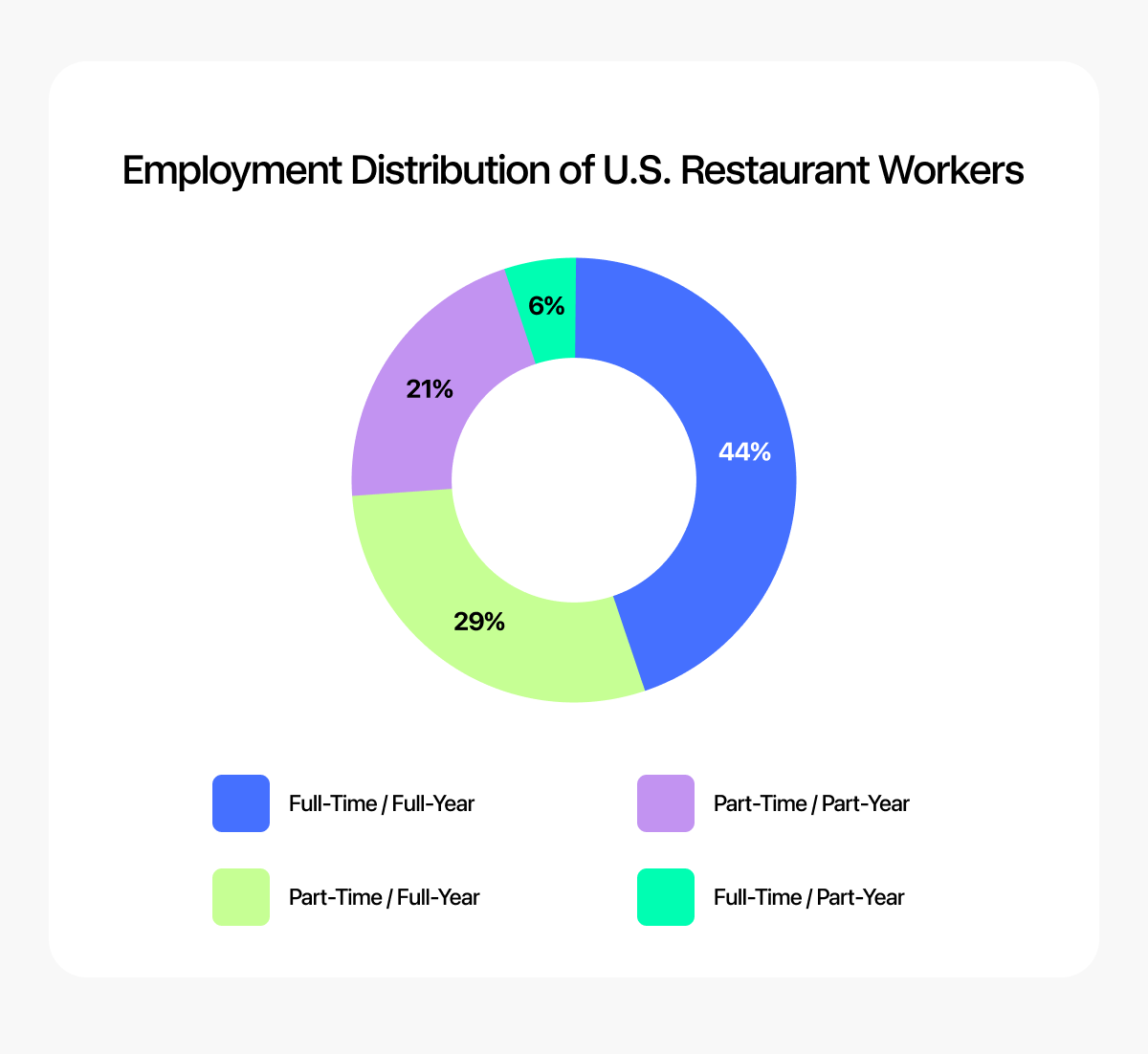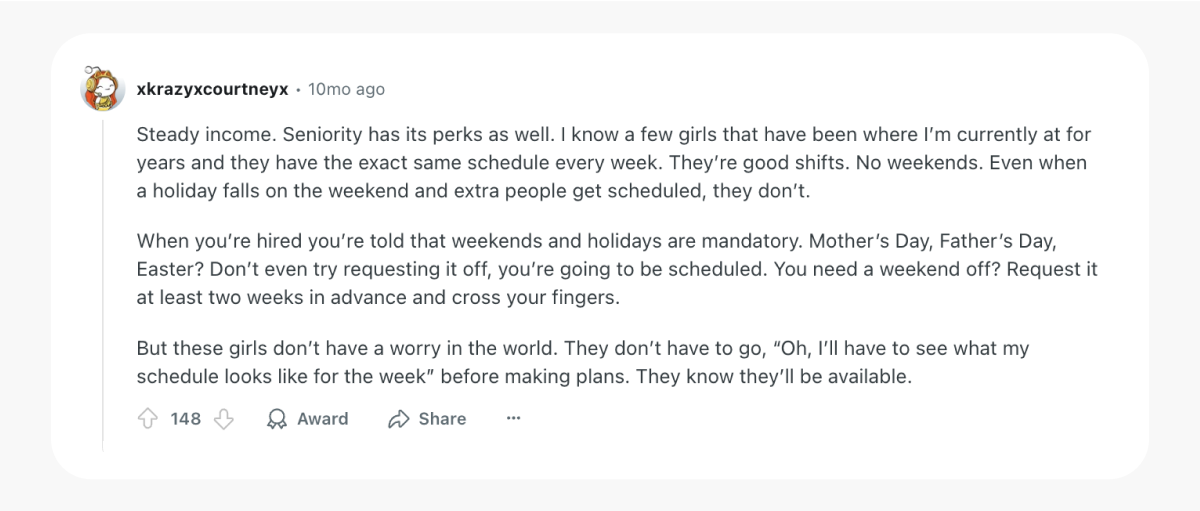|
|
|
|
|
In this edition, we’re raising a glass to the restaurant lifers: the line cooks-turned-GMs, the servers who’ve outlasted five managers, and the dishwashers who now run the show. Turnover gets a lot of attention, but so should those who’ve built a career in hospitality—folks who’ve grown with the industry, see it as a craft, and want to help others do the same.
|
|
|
|
 |
Started from the bottom, now we’re leading |
 |
The busboy to exec chef pipeline |
 |
Why servers stay serving |
|
|
|
|
When someone says, ‘It’s just a restaurant job,’ but they’ve never had to deal with a Saturday night rush, two no-call no-shows, and training the new host—all while the POS is down.
|
|
 |
BY THE NUMBERS
|
|
How many restaurant workers are in this thing full-time? Not very many, according to the National Restaurant Association’s 2025 State of the Industry Report.
|
|
 |
44%
The percentage of the U.S. restaurant workforce working full-time, year-round. |
|
|
|
 |
72%
The percentage of the overall U.S. workforce working full-time, year-round. |
|
And here’s the full breakdown of the restaurant workforce’s typical employment schedule:
|
|
|
 |
HEARD!
|
|
Hospitality lifers see restaurants not just as a job—but as a craft. These folks have built long-term careers in the industry, growing from within and now helping others do the same. This Pre-Shift podcast roundup features their stories—and their advice—for building strong teams and strong careers.
|
|
|
|
👊 Julianna Blackhurst on why she stayed for the long haul
Julianna started at Jeremiah’s Italian Ice at 16—and never left. Now the Senior Director of Franchising & Operations, she’s grown alongside the brand over the past decade. What’s kept her around?“Truly, it’s been the people and the experience that I’ve had—to be able to work alongside these people, moving from our company system to our franchise system, and all of the different hurdles along the way. I wouldn’t want to do that with a different team.”“As the brand has continued to grow, it’s really given me the opportunity to grow with the brand, to learn more…there’s always more to be done.”“For those who say, ‘Hey, I really do have a passion for this…I just really encourage them to speak about that, to put themselves out there, and to continue growing with the brand.”🎧 Listen to the full episode or read the recap.
|
|
🌮 Joe Kahn on how lifers change the culture from within
Joe, now Founder and Chief Innovation Officer of Condado Tacos, started in the industry at 15—and saw firsthand how poorly many workers were treated. He set out to change that.“Really, I think the injustice of this industry is that we’re kind of used and abused…That’s how you were kind of treated in the industry as a server or bartender. I certainly didn’t see a future working in the restaurant business, per se, but I really wanted to change that.”“People like me feel good about the work. We’re not just a bunch of uneducated hooligans…We should have a chance and should be respected enough to advance in a company.”“I see everybody. I want to make sure that everybody can find a place in this world and be able to move up and move forward.”🎧 Hear from Joe and Condado CEO, Chris Artinian
|
|
☕ Avery Ward on how to scout and nurture star players
A third-gen restaurateur and CEO of Little Italy Ristorante, Avery stepped in after a family health crisis—and stayed. Now, he empowers his team to grow by creating space for them to volunteer and learn.“All restaurant owners have to do is raise their hand and say, ‘Hey, I need help.’ If you have good people…and you believe in them, they will step up and help you.”“Do that without what I call ‘crowning the saint.’ When somebody raises their hand and goes, ‘Hey, I’ll help,’ give them some things to do…And if they fail, say, ‘Thanks so much. I appreciate it. I’ll let you know if I need anything else.’”“They weren’t given a title that’s been revoked. They weren’t given power that they no longer have.”He also shared advice for helping team members step into leadership:
- Encourage them to speak up: “I always say that I’m on the inside. I’m always gonna open that door for you—as long as you knock.”
- Set clear expectations: “Five to seven key responsibilities…documented extremely clearly.”
- Share the vision: “If you’re not clear on what the end goal is, everybody feels like they’re working a very stagnant job.
🎧 Listen to the episode or read the recap
|
|
🚀 Chris Britt on how to build from within
Chris worked his way up at Agave & Rye, now serving as Chief Operating Officer. He’s passionate about promoting from within—and doing it the right way.“The good thing about promoting internally—people have worked with you for X amount of time. You can gauge their buy-in…You can tell if people look up to this person. That eliminates a lot of the unknowns from an external hire.”“Everyone can interview well these days. And references? You’re limited on what questions you can ask.”To support internal growth, Chris focuses on two key things:
- A clear roadmap: “We’re working on a plan called ‘Road to Ready’…If you are a server and you want to become a member of leadership…you know exactly what steps you need to accomplish—and in what timeframe.”
- Right pace, not just fast pace: “We don’t want to promote them too quickly…If we say, ‘We don’t think you’re ready,’ it can feel like we don’t believe in them. But that’s not it. We want to set them up for success.”
🎧 Listen to Chris’ episode
|
|
 |
QUIET ON SET
|
|
Let’s take it behind the scenes—literally and figuratively—to talk BOH. Enter Shawn Grodensky, Executive Chef at gusto! in Atlanta, who first discovered his love for cooking as a busboy at his family’s restaurant.
|
|
|
Shawn shares how creating a fallback plan (aka a four-year business degree) ended up being a huge asset in his career. It gave him a strong foundation in business acumen, leadership development, and marketing knowledge—all skills that can be applied to his restaurant career.
And like many in the industry, his career path wasn’t linear—but it was all about relationships. While working at The General Muir, Shawn met Nate Hybl, who would go on to found gusto!. Over a round of golf, Nate shared his vision to reinvent fast food—and Shawn was in.
But Shawn’s story isn’t just about his own rise. It’s about recognizing and nurturing talent in others:
“We had a gentleman who started out as a catering driver. The biggest thing that stood out was his passion. He wanted to grow. He loved what gusto! stood for, and he always strived to be perfect in everything that he did. Once we saw that—you see that they care, you have to care. And he is now one of our local operating partners. He is in charge of one of our restaurants. He leads the team. He is responsible for everything within those four walls.”
His advice for anyone looking to stand out comes down to three main points:
- Show that you’re committed to the job and the company
- Be determined and willing to learn—even if you don’t know anything
- Practice to perfect your craft
|
|
 |
STORIES FROM THE FLOOR
|
|
Okay, but what about those who don’t dream of climbing the ladder? Sometimes, employees are happy with where they’re at and don’t feel the need to change things up. A job is just a job, after all—if it pays the bills, what’s not to like?
We combed through Reddit to gather insights from servers who’ve spent years at one establishment. Here’s why they chose to stick it out (and how operators can encourage a longer tenure):
|
|
|
|
|
|
|
As for the top-voted comment? Totally valid—menu changes aren’t for the weak.
|
|
|
|
 |
SURVEY SAID
|
|
Encouraging lifership in the industry isn’t always easy, but it starts with understanding what employees actually want. The good news? On top of the real-life stories we just shared, we also asked restaurant employees exactly that in last year’s What Employees Want Report. Here are a few key findings:
The top 3 motivators for daily work in the industry:
💃 57% said their coworkers and team
💸 55% said financial incentives
😊 42% said positive customer feedback
The top 3 deciding factors when leaving a restaurant job:
📉 51% said low pay
😤 46% said difficult managers
🔄 34% said life circumstances
For more insights on how you can attract and retain employees (and encourage long-term careers in restaurants), download the full report free.
|
|
 |
À LA CARTE
|
|
You don’t have time for pointless articles. These aren’t those.
Arch Jamjun in The Life of a Server Lifer: “I’ve realized I’m a natural fit for this; it’s no longer something I’m ashamed of. I watch my friends with “better jobs” answer emails over dinner and pity them. I hear about their workplace meetings, and I think about how mine are tastings of pricey food and wine. Sure, I wonder how my job will fit into upcoming chapters of my life, but as someone who has a modest retirement fund, a car, health care, and a home I can envision paying off, I’m really not that bothered. I feel fulfilled when the people I’m serving have a good time—as long as they remember to tip, of course.”
Charlie Brown in We Have to Stop Telling Young People Working in Bars and Restaurants Isn’t a Worthy Career: “I will defend hospitality until I die. It keeps you fit. It gives you skills. It makes you part of a family. It can be a career for life. Anyone who says otherwise is wrong. Sure, customers can suck but so can clients on the other side of a computer screen. Sure, the hours are long, but I know people who worked longer in their insurance jobs. Sure, your boss can be a d**k, but that’s not exclusive to hospitality. Hospitality isn’t a stopgap job. It can be your everything.”
|
|
 |
QUOTABLE
|
|
One last thing. Let’s state the obvious: a long-term restaurant career isn’t for everyone—and that’s okay.
As Alice Cheng, CEO of Culinary Agents (the restaurant industry’s hiring platform), put it on The Pre-Shift podcast:
“This industry isn’t for everyone, right? And that’s okay. One of the beautiful things about working here is that you could be just a stop-gapper, you could just be a side hustler—it’s fine. The great thing I focus on is that it opens the door to other opportunities, and whatever you’re doing here, whatever skills you’re learning or relationships you’re building—you can bring that into the next thing.”
Whether you’re here for a season or a lifetime, the restaurant world leaves a mark—and gives you something to take with you.
|
|
|



















